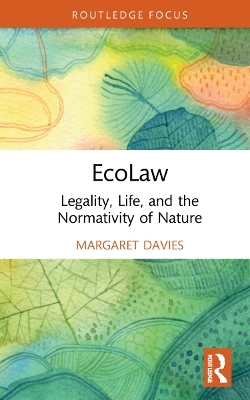
EcoLaw
Legality, Life, and the Normativity of Nature
Seiten
2024
Routledge (Verlag)
978-0-367-65201-2 (ISBN)
Routledge (Verlag)
978-0-367-65201-2 (ISBN)
This book re-imagines law as ecolaw. Drawing inspiration from current trends in the posthumanities, socio-ecological thought, and developments across the natural sciences in their specific intersections with humanities and social science disciplines, this book will appeal both to legal theorists and to others with interests in these areas.
This book re-imagines law as ecolaw.
The key insight of ecological thinking, that everything is connected to everything else – at least on the earth, and possibly in the cosmos – has become a truism of contemporary theory. Taking this insight as a starting point for understanding law involves suspending theoretical certainties and boundaries. It involves suspending theory itself as a conceptual project and practicing it as an embodied and material project. Although an ecological imagining of law can be metaphorical, and can be highly imaginative and suggestive, this book shows that it is also literal. Law is part of the material ‘everything’ that is connected to everything else. This means that once the previous certainties of legal thinking have been dismantled, it is after all possible to think of law as ‘natural’ – as embedded in and emergent from a normative biophysical nature. The book proposes that there exists a natural nomos: animals, plants, and Earth systems that produce their own values and norms from which human norms and laws emerge. This book, then, proposes a new way to understand law, and pursues specific arguments to demonstrate the feasibility of law as ecolaw.
Drawing inspiration from current trends in the post-humanities, socioecological thought, and developments across the natural sciences in their specific intersections with humanities and social science disciplines, this book will appeal both to legal theorists and to others with interests in these areas.
This book re-imagines law as ecolaw.
The key insight of ecological thinking, that everything is connected to everything else – at least on the earth, and possibly in the cosmos – has become a truism of contemporary theory. Taking this insight as a starting point for understanding law involves suspending theoretical certainties and boundaries. It involves suspending theory itself as a conceptual project and practicing it as an embodied and material project. Although an ecological imagining of law can be metaphorical, and can be highly imaginative and suggestive, this book shows that it is also literal. Law is part of the material ‘everything’ that is connected to everything else. This means that once the previous certainties of legal thinking have been dismantled, it is after all possible to think of law as ‘natural’ – as embedded in and emergent from a normative biophysical nature. The book proposes that there exists a natural nomos: animals, plants, and Earth systems that produce their own values and norms from which human norms and laws emerge. This book, then, proposes a new way to understand law, and pursues specific arguments to demonstrate the feasibility of law as ecolaw.
Drawing inspiration from current trends in the post-humanities, socioecological thought, and developments across the natural sciences in their specific intersections with humanities and social science disciplines, this book will appeal both to legal theorists and to others with interests in these areas.
Margaret Davies is Matthew Flinders Distinguished Professor at the College of Business, Government and Law, Flinders University, Adelaide.
Introduction, 1. A New Living Law, 2. Teleologies of the Nonhuman, 3. Biogenesis and Jurisgenesis, 4. Geolaw as Flow and Stasis, 5. Law, Nature, and Legal Theory Conclusion
| Erscheinungsdatum | 05.07.2022 |
|---|---|
| Verlagsort | London |
| Sprache | englisch |
| Maße | 138 x 216 mm |
| Gewicht | 453 g |
| Themenwelt | Naturwissenschaften ► Biologie ► Ökologie / Naturschutz |
| Recht / Steuern ► Allgemeines / Lexika | |
| Recht / Steuern ► Arbeits- / Sozialrecht ► Sozialrecht | |
| Recht / Steuern ► EU / Internationales Recht | |
| Recht / Steuern ► Öffentliches Recht ► Umweltrecht | |
| Technik ► Umwelttechnik / Biotechnologie | |
| ISBN-10 | 0-367-65201-3 / 0367652013 |
| ISBN-13 | 978-0-367-65201-2 / 9780367652012 |
| Zustand | Neuware |
| Informationen gemäß Produktsicherheitsverordnung (GPSR) | |
| Haben Sie eine Frage zum Produkt? |
Mehr entdecken
aus dem Bereich
aus dem Bereich
Lehrbuch zu Grundlagen, Technologie und Praxis
Buch | Hardcover (2022)
Hanser (Verlag)
CHF 48,95


